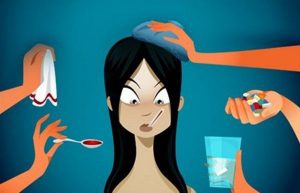Immunomodulators and immunostimulants: the truth and myths about magic pills
 If they used to say that all diseases are from nerves, now they are blamed for weakened immunity. In order to strengthen it, a large number of various means are proposed – immunomodulators (regulating the immune system) and immunostimulants (enhancing immunity). Advertising promises that as soon as you begin to take these miracle pills, your immunity will be strengthened and all diseases will recede. Is it so?
If they used to say that all diseases are from nerves, now they are blamed for weakened immunity. In order to strengthen it, a large number of various means are proposed – immunomodulators (regulating the immune system) and immunostimulants (enhancing immunity). Advertising promises that as soon as you begin to take these miracle pills, your immunity will be strengthened and all diseases will recede. Is it so?
In fact, doctors do not have a common opinion about the benefits of drugs that affect the immune system. But in one they converge: immunomodulators and immunostimulants should be taken only on doctor’s prescription. These drugs are not as harmless as advertising claims. They can cause significant harm to health, if you take them just like that, just in case. Each drug has its own indications, and they must be taken into account. If this is not done, the consequences can be very serious.
Immunity and Immune System
Immunity is the ability of the body to fight various foreign substances, microorganisms that can disrupt its work. Immunity is innate, genetic and acquired, which develops throughout a person’s life. Immunity is realized through the immune system, which is represented by red bone marrow, thymus, spleen, lymph nodes, lymph, and tonsils. Immediate “fighters” with pathological and alien elements are immunocompetent cells – lymphocytes, leukocytes, phagocytes, basophils, eosinophils, etc.
Immune imbalance
The human immune system is a very complex mechanism in which many organs, tissues, and cells are involved. If we begin to interfere with the work of the immune system, even at the level of one of its any link, all its components are subject to change. It threatens to fail, unbalance this unique mechanism and the development of allergic reactions.
The risk of developing autoimmune diseases
With a constant increase in immunity with the help of immunostimulants, you can get excess activity of the immune system. The result may be that the immune system begins to perceive its own cells and tissues as foreign and begins to destroy them. Thus, an organ or even several organs suffer – the body begins to self-destruct. Such conditions are called autoimmune diseases. These include, in particular, multiple sclerosis, rheumatoid arthritis, systemic lupus erythematosus. The trouble is that a cure for these diseases is impossible. Fortunately, if a person does not have predisposing factors, such as a hereditary predisposition, then the risk of autoimmune disease is very small.
Weakening of immunity
Oddly enough, but the unreasonable use of immunostimulants leads to the opposite effect. The immune system gets used to constant stimulation with drugs and starts to work less. As a result, in order to maintain immunity, the body needs to constantly receive new doses of immunostimulants. It turns out a vicious circle from which it is very difficult to get out.
There is no universal immunomodulator
Immunomodulators include a wide range of different drugs: interferons, interleukins, etc., which act on various components of the immune system. There is no one remedy that magically strengthens the immune system. It should be understood which component of the immune system should be strengthened, and depending on this, choose the drug. In addition, some drugs act at the very beginning of the disease, others – at its peak, and others – during remission. Therefore, it makes no sense to prescribe a medicine for yourself – there will be no effect from it, but undesirable consequences are quite possible.
Is there an effect?
A large number of widely advertised immunomodulators against respiratory infections have not passed clinical trials. And this means that their effectiveness and safety have not been scientifically proven. Many doctors consider the most common drugs available and placebo. Interestingly, in the US and Europe, immunomodulators are used only in immunodeficient conditions, and only for the purpose and under the supervision of a physician.
When immunomodulators are needed
Many immunologists believe that it is necessary to take such funds only according to indications after examining a patient and performing an immunogram for him – blood tests for components of the immune system. The indications for receiving immunostimulants are immunodeficiency states, which are characterized by:
frequent respiratory diseases, viral and bacterial infections with complications, recurrent herpes, the occurrence of boils;
allergic diseases;
enlarged spleen and lymph nodes;
the development of autoimmune diseases.
The use of immunomodulators for such conditions should be combined with other therapeutic agents.



